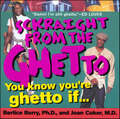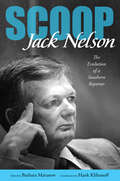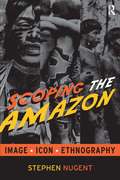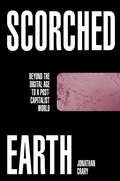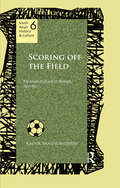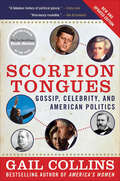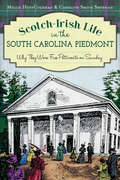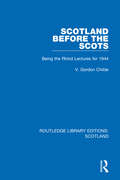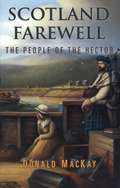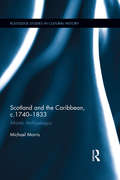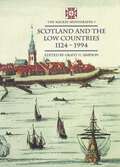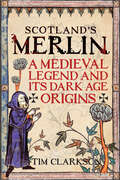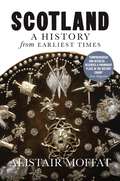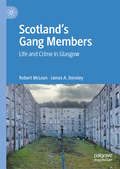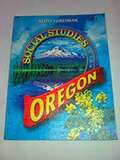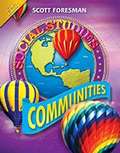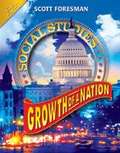- Table View
- List View
Sckraight From The Ghetto: You Know You're Ghetto If . . .
by Bertice Berry Joan CokerIs the only art you own on your fingernails? Do you consider kool-aid one of the five food groups?You know you're ghetto if:-Turning up the heat means turning on another burner on the stove-You think of paneling as a home improvement-You use a pair of pliers to change the channel on your TV-You run to get pots as soon as it rains-Your glasses and silverware come from a gas station-Your weave is longer than your torso-You have more than ten uses for Vaseline-and one of them is shoe polishGhetto is not where you live. Ghetto is not about income or social status. Ghetto is a state of mind.
Scoop: The Evolution of a Southern Reporter
by Jack NelsonFrom a gullible cub reporter with the Daily Herald in Biloxi and Gulfport, to the pugnacious Pulitzer Prize winner at the Atlanta Constitution, to the peerless beat reporter for the Los Angeles Times covering civil rights in the South, Jack Nelson (1929–2009) was dedicated to exposing injustice and corruption wherever he found it. Whether it was the gruesome conditions at a twelve-thousand-bed mental hospital in Georgia or the cruelties of Jim Crow inequity, Nelson proved himself to be one of those rare reporters whose work affected and improved thousands of lives. His memories about difficult circumstances, contentious people, and calamitous events provide a unique window into some of the most momentous periods in southern and U.S. history. Wherever he landed, Nelson found the corruption others missed or disregarded. He found it in lawless Biloxi; he found it in buttoned-up corporate Atlanta; he found it in the college town of Athens, Georgia. Nelson turned his investigations of illegal gambling, liquor sales, prostitution, shakedowns, and corrupt cops into such a trademark that honest mayors and military commanders called on him to expose miscreants in their midst. Once he realized that segregation was another form of corruption, he became a premier reporter of the civil rights movement and its cast of characters, including Martin Luther King Jr., Stokely Carmichael, Alabama’s Sheriff Jim Clarke, George Wallace, and others. He was, through his steely commitment to journalism, a chronicler of great events, a witness to news, a shaper and re-shaper of viewpoints, and indeed one of the most important journalists of the twentieth century.
Scoping the Amazon: Image, Icon, and Ethnography
by Stephen NugentThe Amazon Indian is an icon that straddles the world between the professional anthropologist and the popular media. Presented alternately as the noble primitive, the savior of the environment, and as a savage, dissolute, cannibalistic half-human, it is an image well worth examining. Stephen Nugent does just that, critiquing the claims of authoritativeness inherent in visual images presented by anthropologists of Amazon life in the early 20th century and comparing them with the images found in popular books, movies, and posters. The book depicts the field of anthropology as its own form of culture industry and contrasts it to other similar industries, past and present. For visual anthropologists, ethnographers, Amazon specialists, and popular culture researchers, Nugent's book will be enlightening, entertaining reading.
Scorched Earth: Beyond the Digital Age to a Post-Capitalist World
by Jonathan CraryRefusing the digital world of late capitalism In this uncompromising essay, Jonathan Crary presents the obvious but unsayable reality: our &“digital age&” is synonymous with the disastrous terminal stage of global capitalism and its financialisation of social existence, mass impoverishment, ecocide, and military terror. Scorched Earth surveys the wrecking of a living world by the internet complex and its devastation of communities and their capacities for mutual support.This polemic by the author of 24/7 dismantles the presumption that social media could be an instrument of radical change and contends that the networks and platforms of transnational corporations are intrinsically incompatible with a habitable earth or with the human interdependence needed to build egalitarian post-capitalist forms of life.
Scoring Off the Field: Football Culture in Bengal, 1911–80 (South Asian History And Culture Ser.)
by Kausik BandyopadhyayThis book examines how football, as a mass spectator sport, came to represent a novel, unique cultural identity of Bengali people in terms of nation, community, region/locality and club, contributing to the continuity of everyday socio-cultural life. It explains how football became a viable popular social force with a rare emotional spontaneity and peculiar self-expressive fan culture against the background of anti-imperial nationalist movement and postcolonial political tension and social transformation. In the process, it investigates certain key questions and problems in the social history of football in Bengal, which have hitherto been ignored in the existing works on the subject.The author offers some original arguments in treating football as a cultural phenomenon, setting it squarely in the context of Bengali politics and society. It strengthens the premise that social history of South Asian sport can be meaningfully understood only by looking beyond the sports field. The study, using sport as a lens, has tried to consider some relevant themes of social history, and brings forth important issues of political and cultural history of 20th-century Bengal. Simultaneously, it highlights the transformed role of football as an instrument of reaction, resistance and subversion. It indicates that the football field of Bengal proves to be a mirror image of what society experiences in its cultural and political field, through a series of historical projections of identity, difference and culture.
Scorpion Tongues: Gossip, Celebrity, And American Politics
by Gail CollinsFrom Thomas Jefferson to William Jefferson Clinton, Scorpion Tongues is a popular history of gossip in American politics. Complete with wickedly delightful anecdotes of major and minor politicians and entertainers over the last 200 years, Gail Collins examines the evolving relationship between politicians and the press and the blurring of the lines between politicians and celebrities. Supported by extensive research and written with an entertaining flair, she speculates on how gossip reflects the current moral compass of the time, noting how a rumor, like an unpredictable summer tornado, can flatten one reputation while a similar story passes over another with hardly a rustle. "Hilariously readable" (The Economist), Scorpion Tongues offers sinful scandals and mild hearsay for every taste.
Scotch Verdict: The Real-Life Story That Inspired "The Children's Hour"
by Lillian FadermanIn 1810, a Scottish student named Jane Cumming accused her school mistresses, Jane Pirie and Marianne Woods, of having an affair in the presence of their students. Dame Helen Cumming Gordon, the wealthy and powerful grandmother of the accusing student, advised her friends to remove their daughters from the Drumsheugh boarding school. Within days, the institution was deserted and the two women were deprived of their livelihoods.Award-winning author Lillian Faderman recreates the events surrounding this notorious case, which became the basis for Lillian Hellman's famous play, The Children's Hour. Reconstructing the libel suit filed by Pirie and Woods—which resulted in a scotch verdict, or a verdict of inconclusive/not proven—Faderman builds a compelling narrative from court transcripts, judges' notes, witnesses' contradictory testimony, and the prejudices of the men presiding over the case. Her fascinating portrait documents the social, economic, and sexual pressures shaping the lives of nineteenth-century women and the issues of class and gender contributing to their marginalization.
Scotch-Irish Life in the South Carolina Piedmont: Why They Wore Five Petticoats on Sunday
by Millie Huff Coleman Caroline Smith Sherman"Five Petticoats on Sunday" was originally published in 1962. The book was a collection of columns written by Caroline S. Coleman containing stories her grandmother told about the Fairview community and the South Carolina Piedmont. Coleman's granddaughters, Millie Coleman and Caroline Sherman, have expanded the book with recipes, history and genealogical resources for an enthralling look at the lives of Scotch-Irish residents in the area from Reconstruction until the 1900s. Find out why most homes in the area had a Prophet's Room. Sit with the children as they wait for the "second table" during visiting season and learn exactly why they wore five petticoats on Sunday. Sherman and Coleman examine a time and lifestyle far away from today's modern conveniences but complete with warmth of family.
Scotland Before the Scots: Being the Rhind Lectures for 1944 (Routledge Library Editions: Scotland #6)
by V. Gordon ChildeOriginally published in 1946, this book presents in what can arguably be described as an unusual way, a slice of Scottish social life by applying to prehistory the principles of Marxism as practised by Soviet scholars of Russian prehistory. Using archaeological evidence, the author distinguishes 6 stages – from the earliest definable groups of immigrants to the Iron Age. There are 10 appendices, devoted to the typology and classification of tombs, pottery, implements and fortifications.
Scotland Farewell: The People of the Hector
by Donald MackayThis is the story of the Highland Scots who sailed to Pictou, Nova Scotia, in 1773 aboard the brig Hector. These intrepid emigrants came for many reasons: the famine of the previous spring, pressures of population growth, intolerable rent increases, trouble with the law, the hunger of landless men to own land of their own. Upon arrival at Pictou, after an appalling storm-tossed crossing, they found they had been deceived. The promised prime farming land turned out to be virgin forest. Only the kindness of the Mi’kmaq and the few New Englanders already settled there enabled them to survive until they learned how to exploit the forests and clear land. But survive they did, and their prosperity encouraged shiploads of emigrants, many fellow clansmen, to join them, making northeastern Nova Scotia a true New Scotland.
Scotland and England 1286–1815
by Roger A. MasonThe relationship between Scotland and England has been critical in shaping the cultural and political history of Britain over many centuries, yet historians have rarely devoted much attention to it. This book recognises the importance of viewing the national histories of Scotland and England in a wider British context, and shows how rewarding this field of study is. Ranging from the consolidation of distinct Scottish and English kingdoms to the first formation of the modern British state, the essays examine a wide variety of aspects of Anglo-Scottish relations and demonstrate the value of exploring the British dimension of the national histories of both countries.
Scotland and the Caribbean, c.1740-1833: Atlantic Archipelagos (Routledge Studies in Cultural History #35)
by Michael MorrisThis book participates in the modern recovery of the memory of the long-forgotten relationship between Scotland and the Caribbean. Drawing on theoretical paradigms of world literature and transnationalism, it argues that Caribbean slavery profoundly shaped Scotland’s economic, social and cultural development, and draws out the implications for current debates on Scotland’s national narratives of identity. Eighteenth- to nineteenth-century Scottish writers are re-examined in this new light. Morris explores the ways that discourses of "improvement" in both Scotland and the Caribbean are mediated by the modes of pastoral and georgic which struggle to explain and contain the labour conditions of agricultural labourers, both free and enslaved. The ambivalent relationship of Scottish writers, including Robert Burns, to questions around abolition allows fresh perspectives on the era. Furthermore, Morris considers the origins of a hybrid Scottish-Creole identity through two nineteenth-century figures - Robert Wedderburn and Mary Seacole. The final chapter moves forward to consider the implications for post-devolution (post-referendum) Scotland. Underpinning this investigation is the conviction that collective memory is a key feature which shapes behaviour and beliefs in the present; the recovery of the memory of slavery is performed here in the interests of social justice in the present.
Scotland and the Fictions of Geography
by Penny FieldingFocusing on the relationship between England and Scotland and the interaction between history and geography, Penny Fielding explores how Scottish literature in the Romantic period was shaped by the understanding of place and space. This 2008 book examines geography as a form of regional, national and global definition, addressing national surveys, local stories, place-names and travel writing, and argues that the case of Scotland complicates the identification of Romanticism with the local. Fielding considers Scotland as 'North Britain' in a period when the North of Europe was becoming a strong cultural and political identity, and explores ways in which Scotland was both formative and disruptive of British national consciousness. Containing studies of Robert Burns, Walter Scott and James Hogg, as well as the lesser-known figures of Anne Grant and Margaret Chalmers, this study discusses an exceptionally broad range of historical, geographical, scientific, linguistic, antiquarian and political writing from throughout North Britain.
Scotland and the Low Countries 1124–1994
by Grant G SimpsonEssays exploring Scotland’s connections with Belgium, the Netherlands, and Luxembourg, from the twelfth century to the twentieth century.This collection of essays presents historical approaches to the links which have existed for over 800 years between Scotland and one of the areas of continental Europe closest to her: the Low Countries. Topics include: Flemish settlers in twelfth-century Scotland; the Count of Holland who claimed the Scottish throne in 1291; the Flemish aspect of the Auld Alliance with France; the view of Scotland taken by a Netherlands-born chronicler, Jean Froissart; Scotland’s late-medieval involvement in diplomacy with Guelders and in wool-exports to the Netherlands; the contacts of Scottish patrons with Netherlandish painters in the fifteenth and sixteenth centuries; Scots pursuing military careers and studies in the arts and law in the Low Countries in early modern times; parallels between Belgian Art Nouveau painting and the work of some Glasgow artists around 1900; comparisons between Scotland and the Low Countries in the twentieth century in the realms of social housing and oil exploration. These varied studies add detailed background to the subject of Scotland within Europe: a question now much debated. This volume is the third in the Mackie Monographs series, based on the Mackie Symposia held in the University of Aberdeen, which have as their theme the historical study of Scotland’s overseas contacts.
Scotland's Merlin: A Medieval Legend and Its Dark Age Origins
by Tim ClarksonA medieval historian &“cut[s] through centuries of confusion and complexity&” to uncover the mystery behind the legendary wizard in King Arthur&’s court (Undiscovered Scotland). Who was Merlin? Is the famous wizard of Arthurian legend based on a real person? In this book, Merlin&’s origins are traced back to the story of Lailoken, a mysterious &“wild man&” who is said to have lived in the Scottish Lowlands in the sixth century AD. The book considers the question of whether Lailoken belongs to myth or reality. It looks at the historical background of his story and discusses key characters such as Saint Kentigern of Glasgow and King Rhydderch of Dumbarton, as well as important events such as the Battle of Arfderydd. Lailoken&’s reappearance in medieval Welsh literature as the fabled prophet Myrddin is also examined. Myrddin himself was eventually transformed into Merlin the wizard, King Arthur&’s friend and mentor. This is the Merlin we recognize today, not only in art and literature but also on screen. His earlier forms are less familiar, more remote, but can still be found among the lore and legend of the Dark Ages. Behind them we catch fleeting glimpses of an original figure who perhaps really did exist: a solitary fugitive, tormented by his experience of war, who roamed the hills and forests of southern Scotland long ago. &“Merlin haunts the landscape like a shade, and we&’ll never catch him. But, thanks to Tim Clarkson, we can enjoy the search.&” —The Hazel Tree &“Tim Clarkson should be congratulated on producing a book which marries together painstaking and detailed research with common-sense and open-minded analysis . . . deeply impressive.&” —Undiscovered Scotland
Scotland's Shame: Why Lockerbie Still Matters
by John AshtonThe journalist reveals the scandal behind Scotland&’s Pan Am Flight 103 bombing trial and the questionable conviction of a Libyan terror suspect. The Lockerbie bombing of 1988 remains one of the most notorious acts of terrorism to be perpetrated in the United Kingdom. Its political and foreign policy repercussions have been enormous. Decades later, debate still rages over the conviction of Abdelbaset al-Megrahi, as well as his controversial release in 2009 on compassionate grounds. In Scotland&’s Shame, journalist and researcher John Ashton argues that the guilty verdict, delivered by some of Scotland's most senior judges, was perverse and irrational. He details how prosecutors withheld numerous items of evidence that were favorable to Megrahi. It accuses successive Scottish governments of turning their back on the scandal and pretending that the country's treasured independent criminal justice system remains untainted.
Scotland: A History from Earliest Times
by Alistair MoffatFive hundred million years of Scottish history from the author of Arthur and the Lost Kingdoms: &“Deserves a prominent place in the history canon&” (Scots Magazine). Covering the Ice Age to the recent Scottish Referendum, the acclaimed historian and author explores the history of the Scottish nation. Focusing on key moments such as the Battle of Bannockburn and the Jacobite risings, Moffat also features other episodes in history that are perhaps less well documented. From prehistoric timber halls to inventions and literature, Moffat&’s epic explores the drama of battle, change, loss, and innovation interspersed with the lives of ordinary Scottish folk, the men and women who defined a nation. &“Moffat plunders the facts and fables to create a richly-detailed and comprehensive analysis of a nation&’s past and references a huge number of sources.&” —Scotland Magazine &“The great thing about Moffat&’s account is that, for all its emphasis on uncertainty, it rattles along with complete narrative certainty, to the extent that great events consistently take even a historically literate reader unawares.&” —Scottish Review of Books &“A very readable, well-researched and fluent account.&” —Scotland on Sunday
Scotland’s Gang Members: Life and Crime in Glasgow
by James A. Densley Robert McLeanDrawing on extensive life-history interviews with serious violent offenders, this book offers a unique socio-historical analysis of gang membership and gang evolution in Glasgow, Scotland’s largest city. The book chronicles the lives of young men in and around Glasgow from early childhood to present day and examines the lived experience of family, friendship, community, and crime. It demonstrates how street reputations are won and lost and how gang membership is not a single event but an experiential process of offending, victimisation, consensus, and conflict. The book follows the young men’s descent into knife crime and street violence and the impact of imprisonment on their life chances. Detailed narratives capture how they individually and collectively transitioned from street violence to profit-driven organised crime, before eventually disengaging from gangs and desisting from offending. The book concludes with an in-depth discussion of the evolution of gangs and organised crime in the 21st century and in the inner-workings of Scotland’s marketplace for illegal goods and services, with implications for police, practitioners, and policymakers. A page-turner from start to finish, Scotlands’ Gang Members is a truly unique contribution to knowledge about gangs and crime, written to high academic standards but readable and accessible to all.
Scott Foresman Sidewalks, Communities [Grade 1, Level A2]
by Sharon Vaughn Connie Juel Deborah Simmons Jeanne R. ParatoreNIMAC-sourced textbook
Scott Foresman Social Studies Communities
by Candy Dawson Boyd Geneva Gay Rita GeigerNIMAC-sourced textbook
Scott Foresman Social Studies Communities (Illinois Edition)
by Scott Foresman PearsonScott Foresman Social Studies Communities (Illinois Edition) covers lessons on: Our Community, People in Communities, Where Are Communities?, History of Communities?, Communities at Work, and Governments.
Scott Foresman Social Studies Oregon
by Scott ForesmanGeared toward 4th graders, this book teach about the geography, history, government, and culture of the wonderful state of Oregon.
Scott Foresman Social Studies, Communities (Illinois)
by Inc. Pearson EducationNIMAC-sourced textbook
